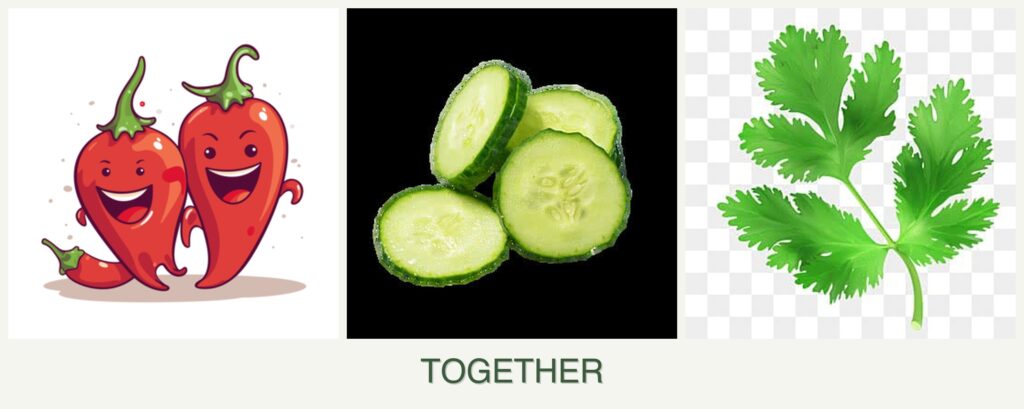
Can you plant peppers, cucumbers and parsley together?
Can You Plant Peppers, Cucumbers, and Parsley Together?
Companion planting is a popular strategy among gardeners seeking to maximize their garden’s productivity and health. By strategically planting certain crops together, you can enhance growth, deter pests, and make efficient use of space. This article explores whether peppers, cucumbers, and parsley can thrive as companions, providing you with the insights you need for a successful vegetable garden.
Compatibility Analysis
Yes, you can plant peppers, cucumbers, and parsley together, but with some considerations. These plants can complement each other when it comes to growth requirements, pest control, and nutrient needs. Peppers and cucumbers both thrive in warm, sunny conditions, while parsley, though slightly more tolerant of shade, can adapt well. They do not compete intensely for nutrients, and their varied root systems help in utilizing soil resources efficiently. However, maintaining proper spacing is crucial to ensure each plant receives adequate sunlight and airflow.
Growing Requirements Comparison Table
| Plant | Sunlight Needs | Water Requirements | Soil pH and Type | Hardiness Zones | Spacing Requirements | Growth Habit |
|---|---|---|---|---|---|---|
| Peppers | Full sun | Moderate | 6.0-7.0, well-drained | 9-11 | 18-24 inches | Upright, 1-3 feet tall |
| Cucumbers | Full sun | High | 6.0-6.8, rich, well-drained | 4-12 | 12-18 inches | Vining, 1-6 feet spread |
| Parsley | Full sun/partial shade | Moderate | 6.0-7.0, rich, well-drained | 2-11 | 6-12 inches | Bushy, 1-2 feet tall |
Benefits of Planting Together
Planting peppers, cucumbers, and parsley together offers several advantages. Parsley can attract beneficial insects like ladybugs, which help control aphid populations that might otherwise harm peppers and cucumbers. The dense foliage of cucumbers can provide ground cover, reducing weed growth and retaining soil moisture. Additionally, the aromatic nature of parsley can deter certain pests, potentially improving the overall health of your garden.
Potential Challenges
While these plants can coexist, they may face challenges such as competition for sunlight due to cucumbers’ sprawling nature. Different watering needs, especially during fruiting, can also pose a challenge. Cucumbers require consistent moisture, whereas overwatering can harm peppers. Disease susceptibility, like powdery mildew on cucumbers, might spread if not managed. To mitigate these issues, ensure adequate spacing and consider drip irrigation for precise watering.
Planting Tips & Best Practices
- Optimal Spacing: Ensure peppers are spaced 18-24 inches apart, cucumbers 12-18 inches, and parsley 6-12 inches.
- Timing: Plant after the last frost when soil temperatures reach at least 60°F.
- Container vs. Garden Bed: Use raised beds or containers with good drainage; cucumbers do well in vertical setups.
- Soil Preparation: Enrich soil with compost to support nutrient needs.
- Additional Companions: Basil and marigolds also pair well with these plants, offering pest control and enhancing flavors.
FAQ Section
Can you plant peppers and cucumbers in the same pot?
It’s not recommended due to their different growth habits and space needs. Use separate pots or a large raised bed.
How far apart should these plants be planted?
Peppers: 18-24 inches, Cucumbers: 12-18 inches, Parsley: 6-12 inches.
Do peppers and cucumbers need the same amount of water?
No, cucumbers need more consistent moisture, especially during fruiting.
What should not be planted with peppers, cucumbers, and parsley?
Avoid planting cucumbers with potatoes and sage, as they can inhibit growth. Peppers should not be planted with fennel.
Will parsley affect the taste of peppers or cucumbers?
No, parsley typically does not alter the taste of neighboring plants.
When is the best time to plant these together?
After the last frost, when the soil is warm, usually late spring.
Companion planting peppers, cucumbers, and parsley can lead to a thriving garden if managed with care. By understanding their needs and how they interact, you can create a harmonious and productive vegetable garden.



Leave a Reply